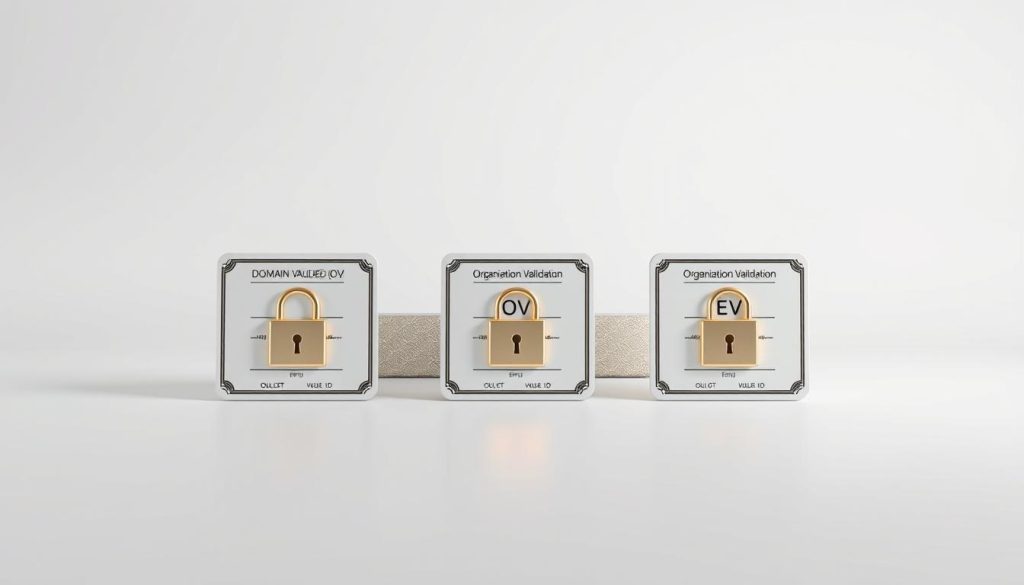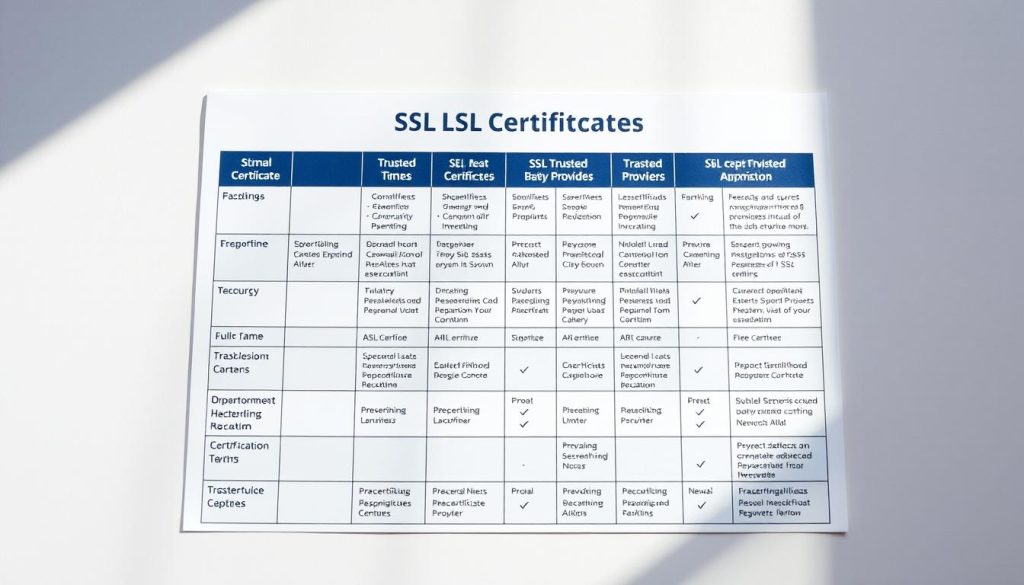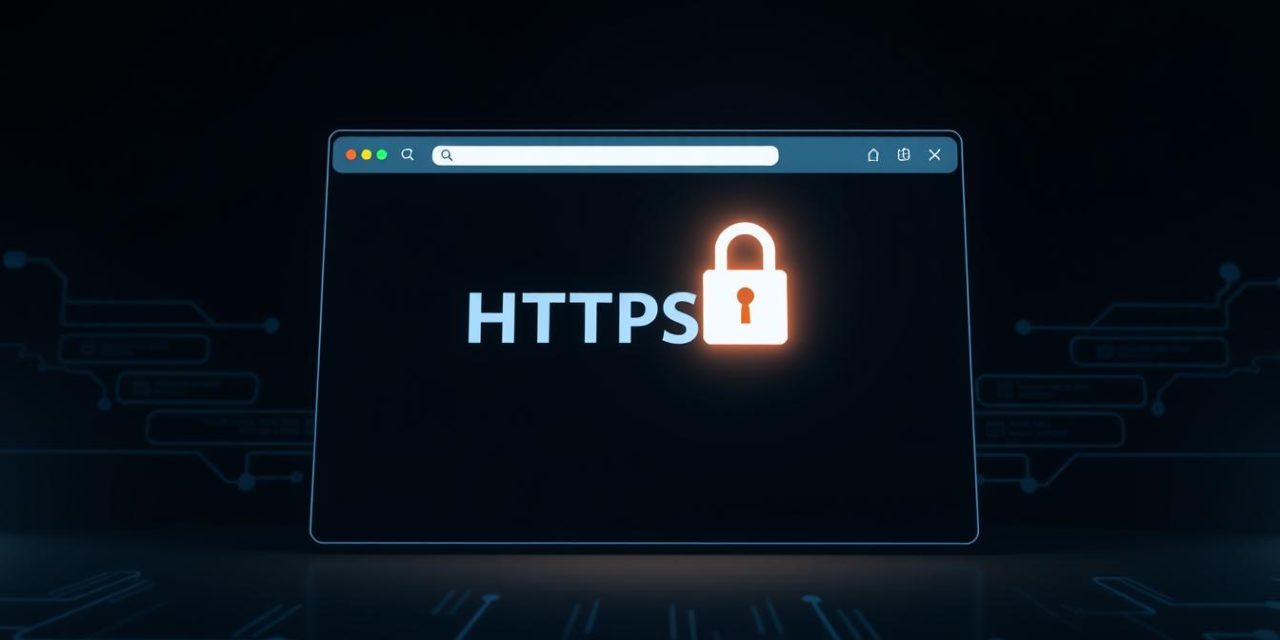Every website needs a strong foundation of trust. In today’s digital world, visitors expect their information to be safe. A secure connection is no longer a luxury; it is a fundamental requirement for any online presence.
This technology creates an encrypted link between a user’s browser and your web server. This protection ensures that sensitive data, like passwords and payment details, travels safely. It prevents criminals from intercepting and reading private information.
Choosing the right solution is a critical decision for your business. This guide will help you understand the different options available. We will compare features and costs to help you find the best fit for your security needs and budget.
Implementing this SSL certificate also boosts your site’s credibility. It shows users you care about their safety. Furthermore, it can positively influence your search engine rankings, making your site more visible.
Table of Contents
Key Takeaways
- A secure connection is essential for building user trust and protecting data.
- Encryption safeguards sensitive information during online transmission.
- Different types of security solutions are available to fit various needs and budgets.
- The right choice can improve your website’s search engine visibility.
- Proper implementation involves installation and ongoing management.
Introduction to SSL Certificates
Online trust is built through verified digital credentials that authenticate your site. These security tools create a foundation for safe data exchange between users and servers.
What is an SSL Certificate?
A digital credential serves as your website’s identity card. It is issued by a trusted certificate authority after proper verification. This authentication enables encrypted communication for all visitor interactions.
The credential contains essential details like domain information and validity dates. It also includes a public key for establishing secure connections. Proper implementation ensures data travels safely across the internet.

Common Validation Levels and Types
Different verification levels cater to various security needs. Domain Validation offers basic protection through automated checks. Organization Validation requires business documentation review.
Extended Validation provides the highest authentication standard. It involves rigorous checks of legal and operational details. Specialized types like Code Signing protect software integrity.
Providers like SSL.com offer Domain Validation with substantial warranties. Their solutions include unlimited server licenses for flexible deployment. Choosing the right level depends on your specific security requirements and business scale.
The Importance of HTTPS in Website Security
The shift from HTTP to HTTPS represents a fundamental change in how websites protect visitors. This transition ensures all data exchanges remain private and secure.

Modern browsers now flag non-secure sites with clear warnings. These alerts immediately damage user confidence and increase bounce rates.
Building Trust with Customers
Visible security indicators create immediate trust with your audience. The padlock symbol and « Secure » label signal serious protection of personal information.
Customers expect HTTPS as the baseline for any site handling data. Without it, your website appears unprofessional and potentially risky.
SEO Benefits and Browser Compatibility
Search engines like Google reward secure sites with better rankings. HTTPS serves as a confirmed ranking signal that boosts visibility.
Browser compatibility is crucial for seamless user experience. Reputable SSL certificates achieve 99.9% trust across major browsers worldwide.
This widespread acceptance prevents security warnings that disrupt access. Proper verification by certificate authorities adds legitimacy that browsers recognize.
SSL Certificate: Best Practices for Installation and Management
The technical process of securing your website requires careful attention to installation details. Proper setup ensures your security measures work effectively from day one.
Step-by-Step SSL Installation Process
Begin by generating a Certificate Signing Request on your web server. This creates the essential key pair needed for encryption. Each platform has specific configuration requirements.
Apache, NGINX, and Microsoft IIS servers each need different setup procedures. Cloud environments like AWS and Azure also have unique steps. Following platform-specific guidance prevents common errors.

After uploading the issued files, configure your server to reference them correctly. Binding to port 443 establishes the HTTPS connection. Verification tools confirm everything works properly.
Effective Certificate Renewal and Support
Ongoing management prevents unexpected security lapses. Keep organized records of expiration dates across all domains. Automated renewal systems eliminate human error.
Quality support resources help with troubleshooting. Platforms like cPanel and Plesk have detailed tutorials. Real-time monitoring alerts you to issues before they affect visitors.
Post-installation testing across browsers ensures complete protection. Proper SSL certificate implementation creates a seamless secure experience for all users.
Exploring SSL Certificate Options and Providers
The market offers diverse security solutions with varying features and price points. Understanding these differences helps you make informed decisions for your website’s protection needs.

Free SSL vs. Paid SSL Certificates
Free security options provide legitimate encryption comparable to paid versions. They work well for personal websites and small projects. However, they typically offer shorter validity periods around 90 days.
Paid solutions justify their cost through extended validation and dedicated support. They include financial warranties and display organization information to visitors. These features build greater trust with your audience.
Comparing Leading Providers: SSL.com and ZeroSSL
ZeroSSL serves millions of clients with quick issuance processes. Their free package includes three 90-day certificates. Paid tiers offer unlimited options with wildcard capabilities.
SSL.com provides enterprise solutions with substantial warranties. Their Basic SSL includes $10,000 protection and unlimited server licenses. They also offer custom-branded issuing authorities for large organizations.
Both providers deliver strong domain validation and browser compatibility. Your choice depends on budget, support needs, and certificate authority reputation.
Advanced Features and Automation in SSL Management
Advanced management tools transform website protection from a manual chore to an automated process. Modern solutions eliminate the risk of expired credentials that could compromise your site’s security.
ACME Integrations and REST API Benefits
The ACME protocol represents the industry standard for automated credential management. This technology handles issuance, validation, and renewal without manual intervention.
REST API access enables programmatic control through all major programming languages. Developers can integrate security operations directly into deployment pipelines.
Automated verification methods accelerate approval from days to seconds. Options include email confirmation, server uploads, and DNS record checks.
These features provide continuous monitoring across multiple domains. The system detects installation issues before they affect operations.
Quality support resources help with troubleshooting complex configurations. This automation particularly benefits organizations managing numerous websites.
Conclusion
The digital landscape demands robust security measures that protect both businesses and their customers. Implementing proper website protection has evolved from an optional enhancement to an essential component of online operations.
Choosing the right security options depends on your specific business needs. Consider factors like domain coverage, validation levels, and available support. Modern automation tools make ongoing management more efficient than ever before.
Proper implementation builds immediate trust with visitors through visible security indicators. This investment pays dividends through enhanced protection, improved search visibility, and stronger customer confidence.
Staying informed about evolving standards ensures your website remains secure against emerging threats. The right security strategy creates a foundation for sustainable online success.
FAQ
What is an SSL/TLS certificate and why is it needed?
An SSL/TLS certificate is a digital file that authenticates a website’s identity and enables an encrypted connection. It’s essential for protecting sensitive data exchanged between a user’s browser and the web server, ensuring privacy and security for information like login details and payment information.
What are the different types of validation available?
There are three primary validation levels. Domain Validation (DV) offers basic encryption and is quick to obtain. Organization Validation (OV) includes business verification, adding more credibility. Extended Validation (EV) provides the highest level of trust, displaying your company name directly in the browser’s address bar.
How does HTTPS improve my website’s security?
HTTPS, activated by installing a valid certificate, creates a secure tunnel for data transfer. This prevents hackers from intercepting and stealing private information. It also confirms your site’s authenticity, protecting visitors from phishing scams and building immediate trust.
Are there benefits for search engine rankings?
Yes. Major search engines like Google use HTTPS as a ranking signal. A secure site can achieve better visibility in search results compared to an unsecured HTTP site, giving you a competitive advantage and driving more organic traffic to your business.
What is the installation process like?
Installation typically involves generating a Certificate Signing Request (CSR) on your server, purchasing or obtaining the file from a provider, and then installing it. Many web hosting companies offer automated tools or dedicated support to simplify this process for you.
How do I manage renewal to avoid site warnings?
Certificates have expiration dates. It’s critical to renew them on time. Providers often send reminder emails. For easier management, consider options with auto-renewal features or explore services that offer automation through protocols like ACME to prevent unexpected lapses in protection.
What is the difference between a free and a paid option?
Free certificates, like those from Let’s Encrypt, are great for basic encryption needs. Paid versions from authorities like SSL.com or DigiCert often include stronger warranties, customer support, and business validation features, which are important for commercial sites handling transactions and sensitive data.
What is a Wildcard certificate?
A Wildcard certificate secures a primary domain and an unlimited number of its subdomains under a single file. For example, one Wildcard for *.yourdomain.com can protect www.yourdomain.com, mail.yourdomain.com, and shop.yourdomain.com, simplifying management for larger sites.





